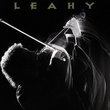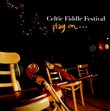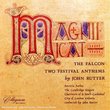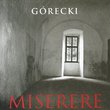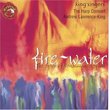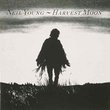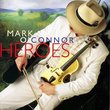| All Artists: John Williams Title: Steam Members Wishing: 1 Total Copies: 0 Label: Green Linnet Release Date: 9/4/2001 Genres: Folk, International Music, Pop Styles: Traditional Folk, British & Celtic Folk, Celtic Number of Discs: 1 SwapaCD Credits: 1 UPC: 048248121521 |
Search - John Williams :: Steam
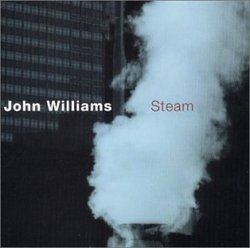 | John Williams Steam Genres: Folk, International Music, Pop
John Williams is a button accordion and concertina player of rare ability, and on Steam, his second solo recording of traditional Irish dance tunes, he demonstrates it when, paradoxically, he plays with great restraint.... more » |
Larger Image |
CD DetailsSynopsis
Amazon.com John Williams is a button accordion and concertina player of rare ability, and on Steam, his second solo recording of traditional Irish dance tunes, he demonstrates it when, paradoxically, he plays with great restraint. Sure, there are some very lively sets of jigs, reels, and hornpipes here. The version of "John Brady's and the Hawk from Dundalk," which features fiddler Liz Carroll and banjoist Seamus Egan, is taken at a tempo that would tax even the quickest step dancer. And on "P.J.'s Pecurious Pachelbel Special," a witty take on the Canon in D, Williams includes some particularly fancy fingering. But it's on the slow tunes like "Miss Hamilton," a lovely 18th-century harp melody, or "Seol Uileo Thoil and The Deer's March," an unusual blend of a lullaby and a march, that Williams shows his true gift. To play fast requires little more than nimble fingers, but to play slowly, and with the feeling the John Williams does, you need a profound understanding of the music that transcends technique. --Michael Simmons Similarly Requested CDs
|
CD ReviewsWhere there's Steam, there's fire Darin Kelly | Philadelphia, PA USA | 09/11/2001 (5 out of 5 stars) ""Fire in the kitchen" is a phrase the Irish use to describe a particularly remarkable performance or musician; On "Steam," the newest release from Irish-American accordion virtuoso John Williams, the glowing embers of divine musical inspiration and sublime elegance are visible far beyond Williams' Chicago skyline. Though Williams may have spent a great deal of his career being mistaken for his movie score composer and classical guitarist namesakes, his accomplishments and wide-ranging abilities place him in the pantheon of today's most important Traditional Irish musicians. Williams has certainly not missed a beat since his departure from Irish-American supergroup Solas, and the myriad of talents he displays on "Steam" suggest he may have been underutilized in that ensemble. While those familiar with Williams' fluid but dramatic style on the button accordion and Anglo concertina will be thrilled enough by his showing on those instruments, many might be surprised that he shows equal virtuosity on the Irish flute, whistles, and bodhran. On "Billy Brocker's/The Old Dudeen/The Night We Had The Goats", Williams moves his fingers deftly around a variety of high and low whistles, with Paul Donnelly's driving bodhran as sole accompaniment. Irish living legends Liz Carroll and John Doyle add timbral complexity and driving rhythm to Williams' flute on "Johnny O'Leary's/Patrick Maloney's Favorite", while he enriches the color of other sets with a lone whistle or two. But it is indeed on the accordion and concertina where he leaves his most indelible mark. Williams is one of those rare players whose sense of inner passion for and unity with the music is always evident in his soulful yet unabashedly energetic style of playing, be it a whirling dervish of a reel, a pulsating jig, an austere march, or an evocative slow air. Quite often, the conrtasts can be jarring. Williams zips across the box with ferocity on the disc's first two rousing sets (reels and jigs, respectively), then turns on a dime into first a few slow reels and then a slow air-like harp transcription with astounding beauty and grace. Throughout the Irish tapestry that is "Steam," Williams weaves together traditional tunes, plus a few new compositions, into well-constructed and creatively orchestrated sets. They range from the rousing, pub-session atmosphere of "John Brady's/The Hawk From Dundalk" to the intimate, sparsely accompanied "Up In The Garrett/The Old Tipperary". Though Williams' heartfelt and marvelous playing is more than enough to make this disc essential, it doesn't hurt that he has surrounded himself with a who's who list of legendary musicians, Irish and otherwise: Carroll, Doyle, Seamus Egan, Dennis Cahill, guitar innovator Dean Magraw, and Pat Metheny Group alum Paul Wertico, among others. The recent resurgence of traditional Irish music has much more than Riverdance to thank for its existance; artists like John Williams have brought it back in to the general public's consciousness through, as written in the liner notes, "talent, grit, and empathy with the music." Hardly anywhere are these displayed more elegantly than on "Steam"." Best Irish CD I've bought this year 06/17/2004 (5 out of 5 stars) "I bought this CD a few weeks ago, and it hasn't left the CD player in my car since I got it. John Williams is one of the best Irish accordionists out there, but this CD is more than a collection of tunes highlighting his virtuosity. The creative arrangements on the sets and the rhythmic interplay between John and his accompanists is reminiscent of the energy from the first Solas album. Best tracks are the first and last reel set, and the slow piece " Miss Hamilton."" Steam 10/09/2001 (5 out of 5 stars) "This is not just another bunch of jigs and reels. Many Irish instrumental recordings seem to be displays of speed and virtuosity that can become boring to listen to. The musicians here are as good as the best, but on this CD they are exploring the depths of the music, not showing off. Listening to Steam, I found a new perspective on the meanings that can be found in these tunes, and hear something new each time I replay it."
|

 Track Listings (13) - Disc #1
Track Listings (13) - Disc #1